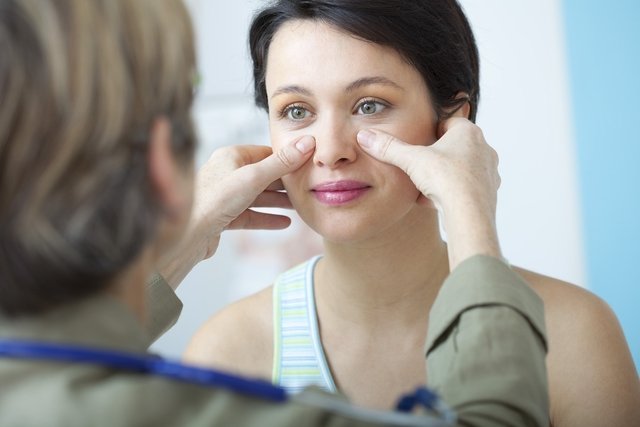Allergic sinusitis is inflammation of the sinuses caused by dust mite, dust or food allergies, resulting in an exaggerated immune system response against these allergens and symptoms such as headache and pain around the eyes or a feeling of heaviness in the face.
Allergic sinusitis is more common in people who have allergic rhinitis, as this condition causes nasal congestion, which can result in phlegm buildup and blocked sinuses. Understand what allergic rhinitis is.
Allergic sinusitis attacks can happen frequently and be quite uncomfortable and, therefore, it is important to identify the cause of the allergy to avoid new attacks. In addition, the doctor may recommend treatment with anti-allergy medications or nasal washing with serum to alleviate symptoms.

Allergic sinusitis symptoms
The main symptoms of allergic sinusitis are:
- Feeling of heaviness in the face or head, especially when bending down;
- Pain around the eyes or nose;
- Constant headache;
- Stuffy or runny nose;
- Cough that gets worse at night;
- Constant sneezing;
- Itching, redness and watery eyes;
- Difficulty breathing;
- Decreased sense of smell and taste.
Furthermore, other symptoms are bad breath, sore throat, tiredness, general malaise or dizziness.
It is important to consult an otorhinolaryngologist whenever symptoms of allergic sinusitis appear, so that the most appropriate treatment can be identified and initiated.
How to confirm the diagnosis
The diagnosis of allergic sinusitis is made by an otorhinolaryngologist, general practitioner or allergist, through the evaluation of symptoms, health history, allergies and allergic rhinitis, in addition to a physical examination.
Taking care of your health has never been easier!
If a person starts treatment and has no improvement in symptoms, the doctor may also recommend imaging tests, such as magnetic resonance imaging or computed tomography, to evaluate the sinuses.
Possible causes
Allergic sinusitis is caused by an exaggerated reaction of the immune system to allergenic substances, and is more common in people who have allergic rhinitis.
The main allergenic substances that can cause allergic sinusitis are:
- Dust or smoke;
- Mite or mold;
- Pollen;
- Animal hair;
- Fungi;
- Chemicals;
- Perfumes;
Thus, allergy to these substances can trigger allergic rhinitis, which causes increased nasal secretion, and results in the accumulation of phlegm in the sinuses, which can become obstructed, increasing the risk of developing allergic sinusitis.
How the treatment is carried out
The treatment of allergic sinusitis must be carried out under the guidance of an otorhinolaryngologist, allergist or general practitioner, who may recommend the use of anti-allergy medicines, decongestant analgesics or nasal corticosteroids, to alleviate symptoms.
In addition, the doctor may recommend nasal washing with saline solution, as it eliminates excess secretions in the sinuses, leaving the phlegm more liquid and making it easier to eliminate, which helps to alleviate the symptoms of sinusitis. See how to wash your nose correctly.
During treatment, exposure to allergenic substances should also be avoided, which can worsen or trigger allergic sinusitis.
Natural treatment
A great natural treatment for allergic sinusitis is to drink plenty of fluids, this way the secretions become more fluid and are eliminated more easily, preventing the proliferation of viruses, fungi or bacteria.
Drinking orange or acerola juice is a good option, as in addition to containing a lot of water, they are good sources of vitamin C that help strengthen the body’s natural defenses. But to make the most of its medicinal properties, you should drink the juice immediately after preparing it. Check out other natural ways to relieve sinusitis.
In addition, eucalyptus essential oil can also be used to help unclog your nose, I can see how by watching the video:
Bibliography
- DYKEWICZ, MS; et al. Allergic fungal rhinosinusitis. J Allergy Clin Immunol. 142. 2; 341-351, 2018
- Curr Allergy Asthma Rep. Biologic Therapies for Allergic Rhinitis and Nasal Polyposis. GENG, B.; et al. 21. 6; 36, 2021
- BATTISTI, AS; MODI, P.; PANGIA, J. IN: STATPEARLS (ONLINE). TREASURE ISLAND (FL): STATEPEARLS PUBLISHING. Sinusitis. 2023. Available at: <https://www.ncbi.nlm.nih.gov/books/NBK470383/>. Accessed on April 28, 2023

Sign up for our newsletter and stay up to date with exclusive news
that can transform your routine!
Warning: Undefined array key "title" in /home/storelat/public_html/wp-content/plugins/link-whisper-premium/templates/frontend/related-posts.php on line 12
Warning: Undefined array key "title_tag" in /home/storelat/public_html/wp-content/plugins/link-whisper-premium/templates/frontend/related-posts.php on line 13




